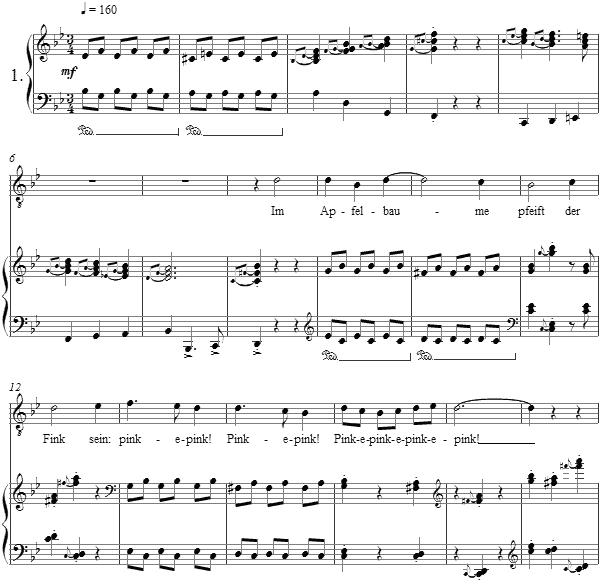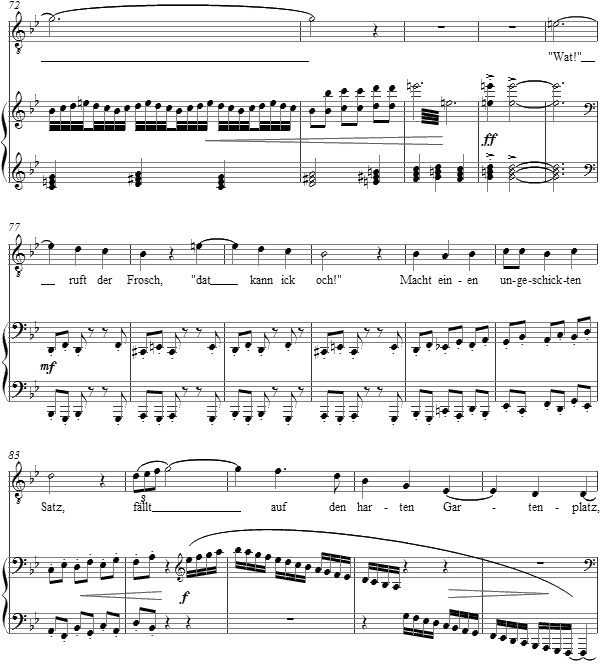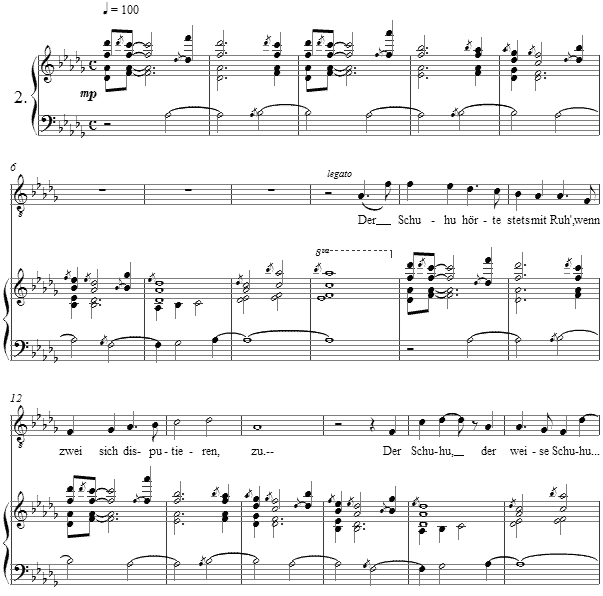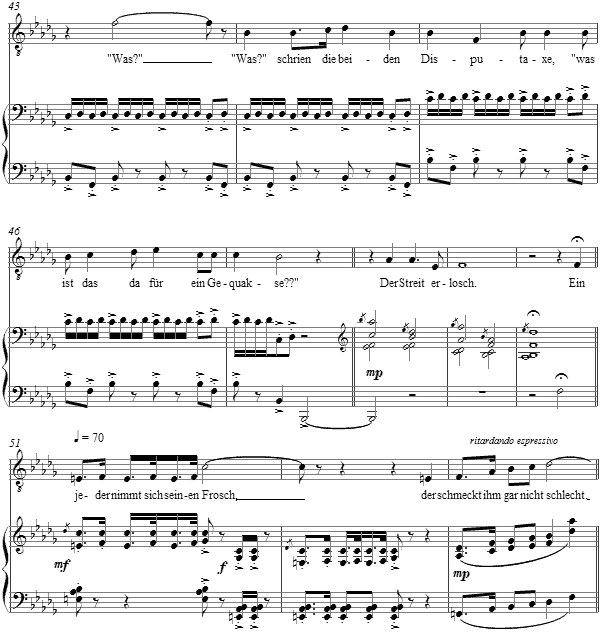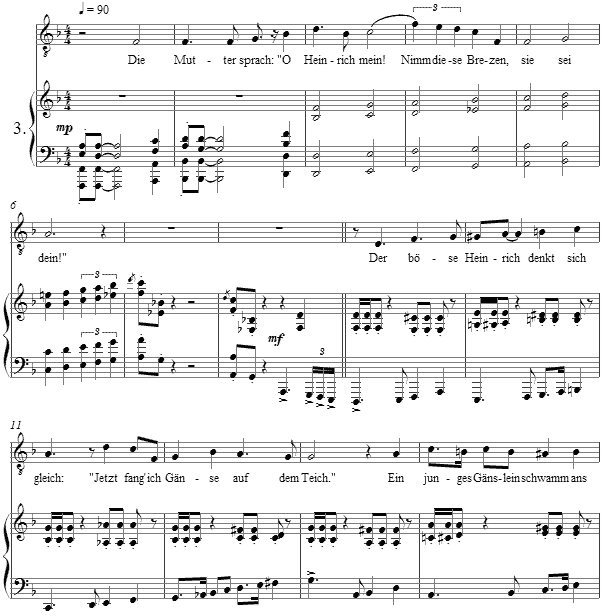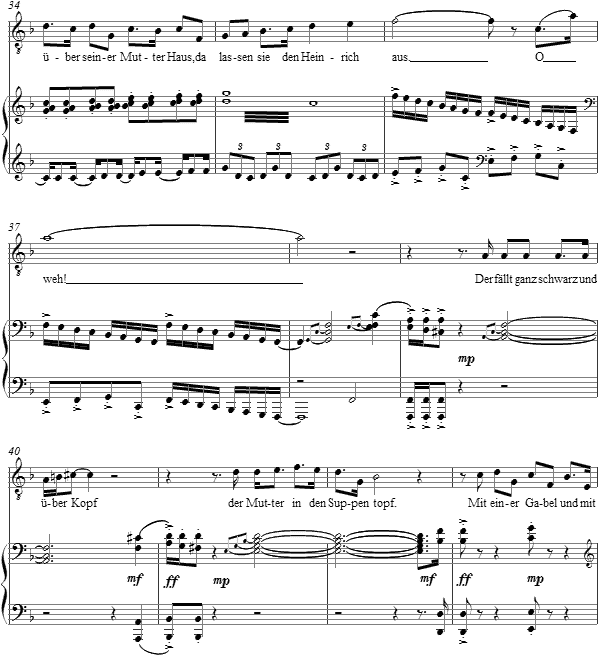Music and Texts of GARY BACHLUND
Vocal Music | Piano | Organ | Chamber Music | Orchestral | Articles and Commentary | Poems and Stories | Miscellany | FAQs
Vogel-lieder - (2010)
Wilhelm Busch
for tenor and piano
Patrick Vogel gewidmet
i. Fink und Frosch - [ 6 pages, circa 2' 30" ]
Im Apfelbaume pfeift der Fink
Sein: pinkepink!
Ein Laubfrosch klettert mühsam nach
Bis auf des Baumes Blätterdach
Und bläht sich auf und quackt: "Ja, ja!
Herr Nachbar, ick bin och noch da!"
Und wie der Vogel frisch und süß
Sein Frühlingslied erklingen ließ,
Gleich muß der Frosch in rauhen Tönen
Den Schusterbaß dazwischen dröhnen.
"Juchheija, heija!" spricht der Fink.
"Fort flieg ich flink!"
Und schwingt sich in die Lüfte hoch.
"Wat!" ruft der Frosch, "dat kann ick och!"
Macht einen ungeschickten Satz,
Fällt auf den harten Gartenplatz,
Ist platt, wie man die Kuchen backt,
Und hat für ewig ausgequackt.
Wenn einer, der mit Mühe kaum
Geklettert ist auf einen Baum,
Schon meint, daß er ein Vogel wär,
So irrt sich der.
ii. Der weise Schuhu - [ 4 pages, circa 3' 00" ]
Der Schuhu hörte stets mit Ruh,
wenn zwei sich disputierten, zu. -
Mal stritten sich der Storch und Rabe,
Was Gott der Herr zuerst erschaffen habe,
Ob erst den Vogel oder erst das Ei.
"Den Vogel!" - schrie der Storch -
"Das ist doch klar wie Brei!"
Der Rabe krächzt: "Das Ei, wobei ich bleibe;
wer's nicht begreift, hat kein Gehirn im Leibe!"
Da fingen an zu quaken
Zwei Frösch in grünen Jacken.
Der eine quakt: "Der Storch hat recht!"
Der zweite quakt: "Der Rab hat recht!"
"Was?" - schrien die beiden Disputaxe -
"was ist denn das für ein Gequakse??" -
Der Streit erlosch. -
Ein jeder nimmt sich einen Frosch,
Der schmeckt ihm garnicht schlecht.
Ja - denkt der Schuhu - so bin ich!
Der Weise schweigt und räuspert sich!
iii. Der hinterlistige Heinrich - [ 4 pages, circa 2' 45" ]
Die Mutter sprach: "O Heinrich mein!
Nimm diese Brezen, sie sei dein!"
Der böse Heinrich denkt sich gleich:
"Jetzt fang ich Gänse auf dem Teich."
Ein junges Gänslein schwamm ans Land,
Schwapp! hat es Heinrich in der Hand.
Es schreit und zappelt fürchterlich;
Die Alten sind ganz außer sich.
Jetzt faßt die Gans den Heinrich an,
Wo sie zunächst ihn fassen kann.
Der Heinrich fällt auf seinen Rücken;
Am Ohr tun ihn die Gänse zwicken.
Sie fliegen dann, - o weh, o weh!
Mit Heinrich fort und in die Höh.
Hoch über seiner Mutter Haus,
Da lassen sie den Heinrich aus.
Der fällt ganz schwarz und über Kopf
Der Mutter in den Suppentopf.
Mit einer Gabel und mit Müh'
Zieht ihn die Mutter aus der Brüh'.
Hier sieht man ihn am Ofen stehn. -
Dem Schlingel ist ganz recht geschehn!
Die Gänse aber voll Ergötzen
Verzehren Heinrichs braune Brezen.[ 14 pages, circa 8' 15" ]
Wilhelm Busch by Wilhelm Busch
These three settings to texts by Busch are small morality plays, if you will. Each tells a tale in which the unwise choice brings unfortunate consequences -- to the egotist, to the big mouth and to the foolish child. Busch intends that these be lessons worth revisiting, in spite of the humor with which they are told. The fun of composing settings of each is two-fold, first for the admiration I have for Busch's often well-placed acidity, and second in a double-entendre named also for tenor Patrick Vogel who has come to the house for coaching, and for whom this set of songs is dedicated.
The rhymed paraphrases do not map onto Busch's scansion, but are made for the sense of the text and for simple amusement with words.
Bird-songs (2010)
i. Finch and Frog
A finch piped up in an apple tree
that finch's cheeky cheep-a-cheep-cheep!
A tree frog climbed up to him laboriously,
Up to a green-leafed roof quite steep,
And swelled himself to croak: "It's me,
Neighborly ready to croak-a-peep-peep!"
And as the bird was fresh, freshly sweet,
So sweet to the spring did it tweet-a-tweet-tweet,
The frog joined in with a raucous bleat,
A moaning drone, quite indiscrete.
The finch burst forth: "Hurrah! Hurray!
I'll think that I shall fly away!"
And leapt into the sky that day.
"What!" cried the frog, "Well so shall I!"
And believing such foolish lie,
Fell splat to the ground where it did die.
Flat as a pancake flat, doornail dead,
It had given its final croak instead.
If someone -- not a bird -- climbs high
And thinks that he might someday fly
Without the wings of the birdy bird,
Why then, such thinking is simply absurd.
ii. The wise owl
The wise old owl holds still his tongue
When two sides' angry words are flung.
A stork and raven once did dispute --
"Did the Lord God (who was truly quite astute)
Make first the egg or bird? Refute!"
The stork screeched, "T'was the fowl!
That is truth, most certainly allowed!"
The raven croaked, "The egg was first!
Who can't see that is brain-dead! Cursed!"
They both went on quite loud and long,
As two nosey frogs joined the duo's song.
The first invoked, "The stork's so bright!"
The second croaked, "The raven's right!"
"What?" the argumentative birds did say.
"Such frogs dare to join in our bird-brain fray?"
The argument ceased right then and there,
As the birds snapped up the usurping pair
And lunched on frog as their lunchtime fare.
"Yup," punned the wise old owl,
"Staying silent, the frogs would not have run afoul."
iii. Dreadful Henry
His mother said, "Dear Henry, son,
"Here're fresh baked pretzels, quite well done."
Henry thought without thinking much,
To bait with pretzel some geese, to clutch.
A gosling swam quite near to shore,
And Henry grabbed it, furthermore.
It struggled with all its goose-like might.
The elders saw its dreadful plight.
The whole gaggle of geese then did attack,
Assaulting Henry, front and back.
Henry fell over from the utter shock,
And was seized upon by all the flock.
With Henry they sprang into the sky,
And flew quite fast and flew quite high.
They came upon the mother's house,
Carrying that mother's awful little louse.
Down the chimney they dropped the lad,
And Henry fell and was bruised quite bad.
Down the chimney with a clatter and bang,
Into the kettle which whistled and sang.
With a ladle so quickly had the mother hooked
Silly, stupid Henry before he was cooked.
In front of the oven he had to stay
To dry out, on that goose-flown day.
The geese, one notes, had a pretzel to eat,
Which tasted all the more deliciously sweet.
Rhymed paraphrases are by the composer.
Copyright 2010 Gary Bachlund All international rights reserved.
The setting places the finch on a branch between the relative tonic major and sub-mediant minor. The setting alters with each picture I imagined, as the finch sings in bright major tonic, while the tree frog is characterized in lower octaves and with contrasting harmonic colors.
The fall of the tree frog to its "flattened" end is pictured with a simple scale dropping four and one half octaves. But, as my old friend, conductor Don Ray from CBS, used to say of the "bad guys" in television and film, even their deaths in a drama deserve a small requiem. For we bid goodbye to the foolish frog as the accompaniment wanders into a small quote from the opening of the last act of La Traviata, quoted cursorily in two tonal regions before settling on the parallel minor's dominant. In proper song form, the recapitulation voices the moral to Busch's comic tale.
The second setting begins with a gentle E flat major to contrast with the first setting. The lyricism of the opening line suggests the wisdom of the silent owl, preparing by this the agitated contrast which is to follow.
The story of the two birds' argument falls back and forth between C minor and E flat major, with percussive sixteenth note gestures and dissonant seconds to illustrate the heat with which this never-answered argument is carried on. As the frogs deign to enter so foolishly into this debate, the setting suddenly turns back to recall some of the opening gestures, where after a quick storm based on the parallel minor's dominant gobbles up the frogs in two brief measures, and a more lyrical returns us to the wisdom of the owl sitting quietly in its E flat major.
The last setting relates to the second as did the second to the first, moving up a minor third to the new tonality. The mother is painted in gently terms, parallel triads, which tip over into the dark relative minor of E flat, depicting Heinrich's foolishness. The opening gesture cannot remain in the relative minor but rapidly moves with chromatic force towards D flat major as the dominant for the next section which will allow return to the tonic of G flat.
The shrieks of Heinrich are characterized by the highest tessitura of the vocal line. The next scenes are painted in a quasi-parlando, until Heinrich is rescued by the mother, and thereafter we enjoy a comfortable final cadence on the tonic major as the geese enjoy their pretzel -- and a sweet revenge.

Patrick Vogel was born in Berlin in 1982 in Berlin and has studied singing at the Hochschule für Musik Hanns Eisler with Roman Trekel. In the spring of 2005 he made his Debut at the Staatsoper Unter den Linden. He has worked with conductors such as Daniel Barenboim, Michael Gielen und Wolfgang Katschner, and studied in master classes with Dietrich Fischer-Dieskau, Thomas Quasthoff, Willy Decker and Peter Konwitschny. Further engagements include many concerts and an upcoming debut at Theater Schwetzingen. He has coached at the house with my wife, and eaten too many of our cookies "...der schmeckt ihm gar nicht schlecht."
The score for Vogel-lieder is available as a free PDF download, though any major commercial performance or recording of the work is prohibited without prior arrangement with the composer. Click on the graphic below for this piano-vocal score.


